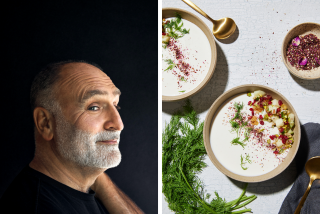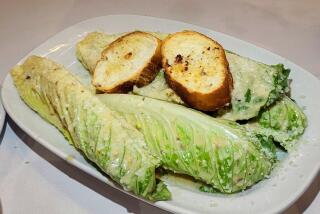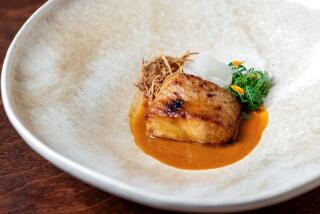Dining with a <i>txoko</i> in Spain’s Basque Country
San Sebastián, the heart of Spain’s Basque Country, is well known for its superb cuisine. The elegant seaside resort of 185,000 lays claim to more Michelin stars per capita than any other city in Europe. Restaurants such as Arzak and Mugaritz, acclaimed for their high-tech gastronomy, attract diners from all over the world.
But there’s another side to San Sebastián’s culinary culture that few outsiders are aware of. The city is home to scores of txokos, private gastronomical societies where members gather to cook, eat, drink, talk and, quite often, sing together. Txoko (pronounced CHO-ko) means “cozy corner” in Basque, and for many members, the clubs are precisely that — a refuge from the daily grind where they can enjoy one another’s company and indulge in the Basque passion for good food.
No one knows exactly when or how txokos began, but the first recorded mention of a sociedad gastronomica, as the clubs are called in Spanish, was in 1870. Today, there are 130 txokos in San Sebastián alone and 1,200 through out the Basque Country.
Until recently, txokos were the exclusive domain of men, but in the last few years the gender barrier has begun to crumble, and many, if not all, clubs admit women. Txokos are, in essence, the Basque version of fraternal orders such as the Elks or Masons, except that food is the main order of business. Meals are typically elaborate affairs featuring dishes made from the Basque Country’s bounty of fresh vegetables, fruits, fish and pork, washed down with plenty of good Spanish wine.
Txokos are normally open only to members, their families and invited guests. The one exception is on Jan. 20 of each year, San Sebastián Day, when the clubs throw open their doors to the public to have a drink (or three) in honor of the city’s patron saint. But you don’t have to wait until the middle of winter to experience a txoko, because several tour operators offer visitors the opportunity to dine with one.
That’s how I was able to spend a memorable evening in mid-June with Zubi-Musu, a club of about 70 members that meets Friday evenings. My entrée was Gabriella Ranelli de Aguirre, an American expat who moved to San Sebastián 20 years ago after falling in love with a young Basque who was studying English in New York. Together with her now-husband, Aitor, Ranelli de Aguirre runs a small company called Tenedor (Spanish for “fork”) specializing in culinary and cultural tours of the Basque Country.
The evening began at 7:30 when Gabriella and Aitor picked me up at my pension in downtown San Sebastián. We popped into a neighborhood bar for some pintxos (pronounced PIN-chos), the Basque version of tapas, and a glass of txakoli (pronounced CHAK-o-LI), the young, dry white wine from the Basque region. Then Gabriella excused herself (although Zubi-Musu admits women, she wasn’t in the mood to dine “with the boys”), and Aitor and I headed to the club.
Zubi-Musu rents a modern ground-floor space in an apartment building in an upscale neighborhood. A long dining table ran the length of one side of the room, beneath a framed photograph of members dressed in white chefs’ aprons and toques and a banner bearing the club’s name. On the other side of the room, the professional-grade kitchen was equipped with glistening stainless steel appliances, pots, pans and utensils.
Aitor introduced me to Jose Juan Izurko, the president and one of the club’s founders. A large, voluble man in his 50s, Izurko appeared to enjoy talking almost as much as cooking and eating. Like most other txokos, he explained, Zubi-Musu was formed by a group of friends and gradually expanded to its current size.
Izurko then introduced me to Xabier Mendizabal, another co-founder and the chief cocinero, or cook. Mendizabal, a math teacher, was waltzing around the narrow kitchen with a glass of txakoli, directing his helpers. His lieutenant, Juan Aguirre, a history teacher, was stirring a skillet containing thick steaks of salted cod and garlic cloves, simmering in a glistening pool of pale yellow olive oil. This was to be the main course, a classic Basque dish called bacalao al pil pil.
It was nearly 10 — early by Spanish standards — by the time Aitor and I sat down to eat with Jose, Juan, Ramon and about a half-dozen other Zubi-Musu members. Our meal began with baguettes and a creamy foie gras — the best I’ve ever tasted — that Izurko had bought in Bayonne, across the Pyrenees in France’s Pays Basque. That was followed by a delicious salad of baby romaine, anchovy fillets and tuna from a fish another member had caught in the Bay of Biscay, smothered in fresh salsa and drizzled with olive oil. Then came the bacalao al pil pil, garnished with sautéed red peppers and onions. Dessert was a Sacher torte made by Xabier’s daughter, capped by strong espresso.
After dinner everyone sang “Zorionak Zuri” (Happy Birthday in Basque) to Xabier, who was celebrating his 55th. The men continued singing traditional Basque songs with the spirited sweetness of choirboys. It was well after midnight by the time the last song was sung and the last glass clinked.
The final task was to tally the cost of the meal and divide the total by the number of diners. Txokos operate on the honor system, so each member is expected to keep track of how much alcohol he consumes. “If there’s a mistake,” Aitor remarked, “it’s usually because someone was too drunk to remember.” My tab was 16 euros, or about $22 — quite a bargain for an unforgettable evening.
More to Read
Sign up for The Wild
We’ll help you find the best places to hike, bike and run, as well as the perfect silent spots for meditation and yoga.
You may occasionally receive promotional content from the Los Angeles Times.






